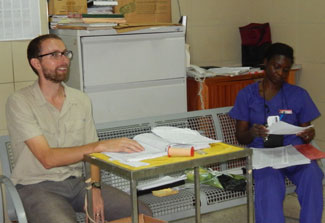Profile: Fogarty Scholar Dr Andrew Gardner casts light on alcohol injuries in Ghana
May / June 2016 | Volume 15, Issue 3
Fogarty Scholar Andrew Gardner wanted to help reduce the burden of injury in Ghana, so he decided to investigate the role of alcohol. His findings came as a big surprise to Ghanaians, who generally thought dangerous alcohol use was rare in their country. But Gardner's research showed more than a third of injured patients seeking urgent care had been drinking.

Photo courtesy of Andrew Gardner
Research by Fogarty Scholar Andrew Gardner (left) on alcohol's
contribution to injury in Ghana may help inform policymakers
deciding on cost-effective interventions.
"The study helped highlight the importance of developing countermeasures and making it routine to test alcohol levels in everyone who comes into the emergency room," said Gardner, a medical student and participant in Fogarty's Global Health Program for Fellows and Scholars. The initiative provides a yearlong mentored clinical research experience overseas for postdoctoral fellows and pre-doctoral scholars.
Ghana is working to reduce its level of injuries, most of which occur on the roads, and by 2050 plans to halve the number of traffic fatalities from the 2010 level of nearly 2 million. But having accurate scientific data is key to identifying cost-effective interventions and Ghana has very little documentation on prevalence of alcohol related injuries. "If you want to direct health resources, it's important to know, 'How common is this?'" Gardner said.
His project involved measuring alcohol concentrations in injured people admitted to the emergency room at Komfo Anokye Teaching Hospital in Kumasi to determine who was 'acutely alcohol-positive' - meaning had been drinking - when they were hurt. He also studied whether patients were risky drinkers - for instance, tended to binge drink - even if they were sober when they entered the hospital. Alcohol levels were measured via a breathalyzer or, if the patient was unconscious, with a saliva test strip. Garner's team also assessed drinking habits in a face-to-face survey.
In addition to revealing the large proportion of patients who had been drinking when they were hurt, the study held other surprises. The first was that drinking was prevalent in all subcategories, including sex, age, religious affiliation and educational status. Second, more than 40 percent of pedestrians who were hit by a vehicle had been drinking.
"That was very interesting, because many people in the emergency department had tended to blame the driver when a pedestrian got hit," Gardner said. "But now we realized it may not have always been the driver's fault."
During his fellowship, Gardner also helped triage newly arrived patients and saw vividly how much injury road accidents can cause in developing countries like Ghana. "The pre-hospital and ambulance care of patients is still being developed, so when there were traffic accidents, the police would show up in a pick-up truck with the victims," Gardner recalled. "This made it palpable how serious injury is in low-resource settings and how it can affect families on a daily basis, forever changing them."
When he arrived in Ghana, Gardner had already nurtured an interest in improving health in disadvantaged populations as a Peace Corps volunteer in Madagascar and clinic volunteer in Malawi. Then at the University of Michigan, he helped establish a student-run free clinic for a disadvantaged rural population and began to wonder how their backgrounds related to their health risks. "I started to realize how important it is to generate new information to provide the most value for the community and the patient," he said. "It took me a while to realize, that's called research!"
Gardner says he learned many skills during his fellowship, such as project design, different research methodologies, data organization and analysis, and manuscript writing. He also learned how to build and manage a team of people from different backgrounds, using their individual strengths. "The Fogarty year really helped me sharpen my focus career-wise and reaffirm the importance of research," he said. "It has also helped reaffirm my passion for global health equity."
More Information
To view Adobe PDF files,
download current, free accessible plug-ins from Adobe's website.